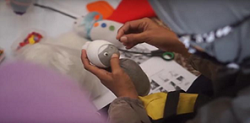Pemanfaatan Barang Bekas sebagai Alat Peraga Edukasi Ramah Lingkungan Sekolah PAUD di Kota Yogyakarta Utilization of Used Goods as Environmental Friendly Educational Teaching Tools for Early Childhood Schools in Yogyakarta
Main Article Content
Abstract
This paper has the aim of demonstrating the importance of environmentally friendly educational props by utilizing used goods. The implementation of teaching and learning activities at Pre-Kindergarten Kota Yogyakarta has problems with limited educational aids (APE). The existence of APE is one of the keys in carrying out the learning process. The low level of teacher creativity in making APE, in this case, becomes the anchor to provide APE for the learning process. This APE can be made by enhancing the creativity between teachers and parents of parents. During the Covid-19 pandemic, teaching and learning activities in Pre-Kindergarten were carried out in their respective homes. To support the use of APE, training on the use of used goods was conducted. Through training in the use of used goods, the aim is to utilize items around and be used as children's learning media for teachers and parents. In addition, to increase the creativity of teachers and parents. Used goods are recycled into useful items. The use of used goods reduces the increasing waste of waste. Through training on the use of used goods as educational props, it can facilitate learning methods both at home and school for early childhood and reduce waste of used goods.
Downloads
Article Details
Authors who publish with this journal agree to the following terms:
- Any article on the copyright is retained by the author(s).
- Author grant the journal, right of first publication with the work simultaneously licensed under a Creative Commons Attribution License that allows others to share work with acknowledgment of the work authors and initial publications in this journal.
- Authors are able to enter into a separate, additional contractual arrangements for non-exclusive distribution of published articles of work (eg, post-institutional repository) or publish it in a book, with acknowledgment of its initial publication in this journal.
- Authors are permitted and encouraged to post their work online (e.g., in institutional repositories or on their websites) prior to and during the submission process, as can lead to productive exchanges, as well as earlier and greater citation of published work.
- The article and any associated published material is distributed under the Creative Commons Attribution-ShareAlike 4.0 International License
References
Hasanah, U. 2016. Pengembangan Kemampuan Fisik Motorik Melalui Permainan Tradisional Bagi Anak Usia Dini. Jurnal Pendidikan Anak. 5(1):717-733. https://doi.org/10.21831/jpa.v5i1.12368
Hidayanti, M. 2019. Kesiapan Sekolah Anak Kelompok Bermain Berbasis Model Pembelajaran Sentra. Publicitas. 13(1):1-19.
Hijriati. 2017. Peranan Dan Manfaat APE Untuk Mendukung Kreativitas Anak Usia Dini. Bunayya: Jurnal Pendidikan Anak. 3(2):59-69.
Irfandi, Faisal, Hasibuan, N.I., Panggabean, D.D. 2018. The Dissemination of Technology-Based Learning Media for Elementary School Teachers in the District of Sijunjung. JCRS (Journal of Community Research and Service). 2(1):198-205. https://doi.org/10.24114/jcrs.v2i1.10491
Juwairiah. 2013. Alat Peraga Dan Media Pembelajaran Kimia. Visipena. 4(1):1-13. https://doi.org/10.46244/visipena.v4i1.85
Kurniawati, W., Atmojo, S.E. 2017. Pembelajaran Sains Bermuatan Karakter Ilmiah Dengan Alat Peraga Barang Bekas Dan Asesmen Kinerja. Jurnal Pendidikan Indonesia. 6(1):49-59. http://dx.doi.org/10.23887/jpi-undiksha.v6i1.8866
Murdiyanto, T., Mahatama, Y. 2014. Pengembangan Alat Peraga Matematika Untuk Meningkatkan Minat Dan Motivasi Belajar Matematika Siswa Sekolah Dasar. Sarwahita: Jurnal Pengabdian Kepada Masyarakat. 11(1):38-43. https://doi.org/10.21009/sarwahita.111.07
Nurrita, T. 2018. Pengembangan Media Pembelajaran Untuk Meningkatkan Hasil Belajar Siswa. Misykat: Jurnal Ilmu-ilmu Al-Qur’an, Hadist, Syariah dan Tarbiyah. 3(1):171-187. http://dx.doi.org/10.33511/misykat.v3n1.171
Rangkuti, M.A., Manurung, I.F.U., Tarigan, N., Panggabean, D.D., Irfandi, Harahap, M.H., Syah, D.H. 2019. Pendampingan Guru-Guru Sekolah Dasar Mendesain Pembelajaran Tematik Berbasis Alat Peraga Di Kecamatan Medan Helvetia. Publikasi Pendidikan: Jurnal Pemikiran, Penelitian dan Pengabdian Masyarakat Bidang Pendidikan. 9(3):232-239. https://doi.org/10.26858/publikan.v9i3.10296
Sanjaya, W. 2013. Kurikulum dan Pembelajaran: Teori dan Praktik Pengembangan Kurikulum Tingkat Satuan Pendidikan (KTSP). Jakarta: Kencana Prenada Media Group.
Taufiq, M., Dewi, N.R., Widiyatmoko, A. 2014. Pengembangan Media Pembelajaran Ipa Terpadu Berkarakter Peduli Lingkungan Tema Konservasi Berpendekatan Science-Edutainment. Jurnal Pendidikan IPA Indonesia. 3(2):140-145. https://doi.org/10.15294/jpii.v3i2.3113
Widiyatmoko, A., Pamelasari, S.D. 2012. Pembelajaran Berbasis Proyek Untuk Mengembangkan Alat Peraga IPA Dengan Memanfaatkan Bahan Bekas Pakai. Jurnal Pendidikan IPA Indonesia. 1(1):51-56. https://doi.org/10.15294/.v1i1.2013
